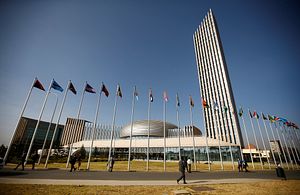Six years ago, in January 2012, the African Union inaugurated its new headquarters in Addis Ababa, Ethiopia. The $200 million building was funded and largely built by China, even using building materials imported from China.
“China — its amazing re-emergence and its commitments for a win-win partnership with Africa — is one of the reasons for the beginning of the African renaissance,” Ethiopia’s prime minster said at the time. The nearly-100 meter tower of the AU building served as a visible symbol of China’s partnership with the African Union, and its member countries.
That symbolism took a hit this week, with an explosive report by French paper Le Monde alleging that China had used its involvement in the construction project to bug the building – even arranging for the AU computer network, also China’s handiwork, to copy data to servers in Shanghai each night. According to the report, the espionage was not noticed until January 2017 – meaning China had access to sensitive data from within the building for five years.
The AU has since put new cybersecurity measures in place – and declined China’s offer to configure its brand new servers. During a sweep of the building, microphones were found in the walls and under desks. Reports from 2012 had noted that even the office furniture of the new AU headquarters had been supplied by China; that generosity looks more suspect now.
China immediately and categorically denied the allegations. Chinese Ambassador to the AU Kuang Weilin told reporters in Ethiopia that the claims of Chinese espionage at the headquarters were “absurd” and “difficult to understand.”
Chinese foreign ministry spokesperson Hua Chunying went further, saying “What was reported by Le Monde in this case is utterly groundless and ridiculous.”
“We never interfere in Africa’s domestic affairs and never engage in any activity detrimental to Africa’s interests,” Hua said. “China-Africa cooperation will in no way be disrupted by the nonsense report of Le Monde.”
Kuang seems to disagree on that point, saying, “Certainly, it will create problems for China-Africa relations.”
The Le Monde report notes that China is not alone in spying on the AU – British and French intelligence services have previously targeted the organization as well. At least one diplomat who spoke to the French paper was not too concerned about the alleged espionage, saying that at least China had not colonized African countries, and was currently helping out economically.
But the optics of China supplying every detail of the new headquarters, right down to the furniture, only to have used those same gifts for espionage, are troubling – especially as China seeks to bolster support for construction projects of all kinds across Eurasia in the name of the Belt and Road.
Plus, if the Le Monde report is true, more than the AU may have been compromised. The AU headquarters is far from the only government building China has constructed in Africa. China recently inked deals to build and finance parliament buildings in Zimbabwe and the Republic of Congo, not to mention the entire Central Business District of Egypt’s new administrative capital. Finished projects include parliament buildings in Malawi, Seychelles, Guinea-Bissau, and Lesotho as well as a renovation of the parliament building of Sierra Leone.
According to Deloitte’s Africa Construction Trends (2017) report, China financed 15.5 percent of projects reviewed — more than any other single country. When it comes to construction, China has an even larger lead:
China has overtaken private domestic firms as the most prolific (and single country) builder of projects, constructing 85 projects… Italian firms are the next most prominent builders, albeit some way behind with 17 projects.
In East Africa specifically, the report found that China finances “one in four projects in the region” and constructs “over half of all projects.”
Despite Beijing’s denials, the Le Monde report calls into question the (literally) hidden costs of allowing China to construct government buildings and other sensitive infrastructure — in Africa and elsewhere.

































